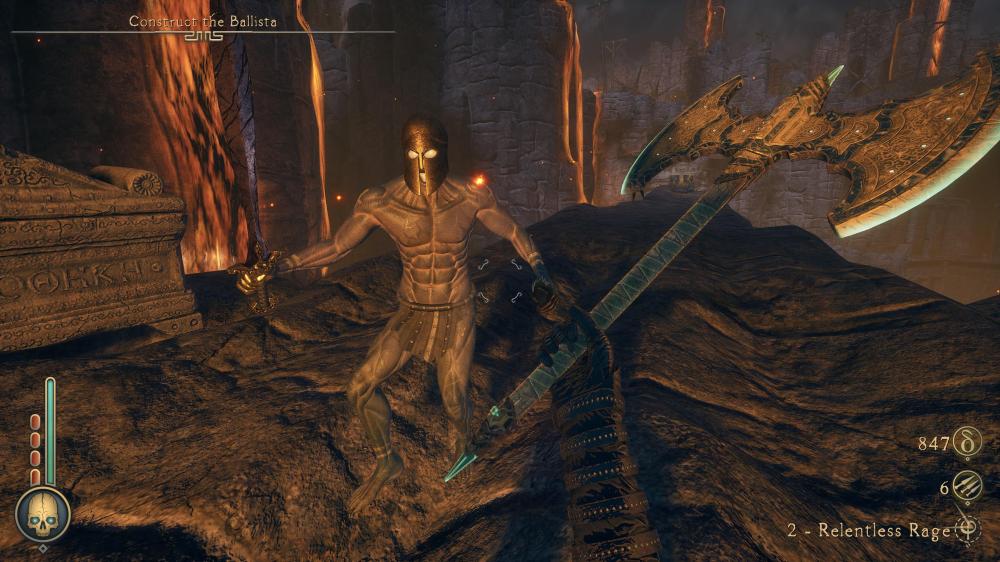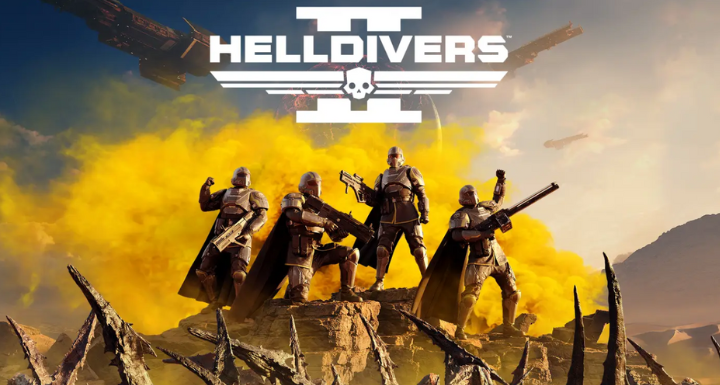
Perish
is
basically
the
weird
love
child
of
DOOM
Eternal
and
Hades,
combining
the
intense
action
and
heavy-metal
riffs
of
the
former
with
the
roguelike
structure
and
mythological
storytelling
of
the
latter.
But
just
like
real-world
genetics,
just
because
you
combine
the
best
DNA
possible
does
not
mean
you’re
going
to
end
up
with
something
better
than
the
sum
of
its
parts.
Perish
isn’t
even
close
to
being
as
awesome
as
either
of
its
parents,
but
if
you
take
it
out
of
the
shadow
of
those
two
Titans
it’s
a
decent
budget
roguelike
shooter
in
its
own
right.
Perish
has
actually
been
out
on
PC
since
late
last
year.
I
missed
it
though,
which
is
why
I’m
here
reviewing
its
console
release
on
Xbox
and
PlayStation
hardware.
Progression
is
handled
through
a
barebones
roguelike
structure
where
you
die,
hopefully
get
a
permanent
upgrade
and
then
try
again
with
the
aim
of
making
it
a
stage
or
two
further
this
time.
Every
time
you
successfully
complete
an
objective
you’ll
pick
from
a
selection
of
cards
offering
boosts
of
power,
perhaps
adding
fire
damage
to
your
throwing
knives
or
making
your
kick
attack
extra
powerful.
Some
cards
are
useful
and
synergise
well
with
other
cards
or
certain
weapons,
so
the
most
successful
runs
typically
happen
because
you
lucked
into
the
right
choices.
Other
cards
are
clearly
useless.
Sadly,
there’s
only
a
small
pool
of
these
cards
to
pick
from.
Available
On:
PC,
Xbox,
PlayStation
Reviewed
On:
PS5
Price:
£15.99/$19.99
Developed
By:
Item
42
Published
By:
HandyGames
Review
code
provided
by
the
publisher
Every
enemy
killed
and
every
objective
completed
adds
Danke
to
your
bank
account
which
you
can
then
use
to
buy
rings,
crowns,
new
weapons
and
more
that
will
aid
in
your
next
attempt.
As
tempting
as
it
may
be
to
constantly
strive
toward
reaching
the
next
area,
sometimes
its
smarter
to
cut
a
run
short
by
voluntarily
heading
back
home.
Doing
so
means
you
get
to
bank
all
the
Danke
you’ve
collected
rather
than
a
sliver
of
it
upon
your
gruesome
demise.
Then
again,
pushing
for
the
next
area
means
you
might
finally
unlock
a
new
melee
or
ranged
weapon
to
try
out,
like
a
shotgun
or
a
self-replicating
spear.

Advertisements
Eventually,
you
unlock
the
ability
to
buy
a
couple
of
special
crows
that
allow
you
to
skip
areas
of
the
game
so
that
you
don’t
have
to
replay
them
over
and
over.
The
downside
is
that
you
won’t
get
all
of
the
cards,
so
you’ll
be
a
bit
weaker.
Combat
is
a
mixture
of
guns
and
melee
weapons,
ranging
from
shotguns
to
broadswords.
The
first-person
view,
the
thumping
heavy
metal
soundtrack
(which
is
awesome)
and
the
often
demonic-looking
enemy
designs
give
off
DOOM
vibes,
but
the
feeling
of
the
gunplay
and
slashing
doesn’t
manage
to
live
up
to
it.
The
melee
weapons
are
okay
and
are
fairly
fun
to
swing
around,
albeit
a
little
imprecise
which
is
something
we
see
a
lot
in
first-person
melee
combat.
They
feel
a
bit
useless
compared
to
the
guns,
though,
because
having
the
option
to
deal
with
enemies
both
up
close
and
far
away
feels
far
more
useful,
especially
against
the
ranged
enemies
that
show
up
later.
The
guns
have
a
decent
sense
of
power
to
them
and
it’s
fun
to
unload
into
the
hapless
foes,
at
least
for
a
while.
After
the
first
couple
of
hours
though,
that
sense
of
fun
vanishes.
It’s
mostly
because
the
enemies
aren’t
hugely
interesting
to
fight:
they
run
straight
at
you
or
hang
back,
and
are
easily
duped
by
jumping
and
strafing,
so
deaths
mostly
happen
due
to
sheer
numbers
or
because
you
get
sloppy.
Speaking
of
dying
due
to
numbers,
there
is
a
significant
difficulty
spike
that
occurs
about
halfway
through
the
game
in
a
section
that
takes
place
in
a
massive
forge.
Not
only
are
the
enemies
here
far
more
durable,
but
they
also
spawn
in
far
greater
numbers
and
the
combination
makes
for
a
nightmare
section
to
fight
through.
Most
of
my
time
with
Perish
was
spent
just
trying
to
get
through
this
single
area,
and
getting
genuinely
pissed
off
because
I
couldn’t
do
it.
No
new
upgrades
or
other
methods
of
progression
popped
up
either,
so
it
was
a
case
of
banging
my
head
against
the
wall
until
eventually,
I
muddled
through.

This
surge
in
difficulty
might
be
due
to
the
game’s
co-op
feature.
While
you
can
tackle
Perish
alone,
there’s
also
the
option
to
hook
up
with
three
other
people.
Given
how
many
foes
spawn
in
the
forge,
I
wonder
if
it’s
a
case
of
not
being
properly
balanced
for
a
solo
player
like
myself.
Regardless,
taking
a
few
other
people
along
for
the
ride
does
make
Perish
a
better
experience,
although
nothing
in
the
game
is
specifically
built
around
co-op
–
there
are
no
interesting
mechanics,
and
only
a
few
upgrades
seem
to
focus
on
teamplay.
I
say
this
is
a
basic
roguelike
simply
because
it
lacks
a
lot
of
the
variation
that
you’d
expect
from
the
genre.
The
levels
themselves
and
their
layouts
are
static,
for
example:
in
each
run
you’ll
go
through
the
same
locations,
with
only
the
objectives
themselves
changing.
Even
those
are
drawn
from
a
very
small
selection
of
possibilities
though.
Boss
battles
always
occur
at
the
same
time
too,
and
are
always
exactly
the
same
each
time
you
face
them.
In
a
game
where
you
are
expected
to
die
a
lot
and
start
from
the
beginning,
I
found
the
lack
of
variety
in
the
levels
and
enemies
to
be
a
problem.
Within
just
a
few
runs,
it
had
begun
to
feel
repetitive,
whereas
in
the
best
roguelikes,
the
mixture
of
changing
levels,
weapons,
skills,
enemies,
objectives
and
more
can
keep
things
interesting
for
far
longer.
Nor
does
the
game
build
its
story
around
its
structure
like
Hades
or
Returnal
do,
giving
you
even
less
to
look
forward
to
upon
death.
Those
games
would
cleverly
use
your
inevitable
demise
as
a
way
to
further
the
story
but
Perish
just
dumps
you
back
at
a
bland
hub
that
contains
two
NPCs
and
a
table
where
you
buy
upgrades.

Speaking
of
which,
the
story
is
at
least
somewhat
interesting.
Snippets
are
given
at
the
start
of
each
new
level,
although
they
repeat
as
well,
and
you
can
pick
up
supplemental
plot
details
by
gathering
up
collectables.
Due
to
the
design
of
Perish,
it
can
mean
you’ll
often
go
a
long
time
without
any
new
story
information,
but
the
rich
blend
of
Chinese,
Greek,
Christian
and
Roman
mythologies
is
really
cool.
As
a
spirit
trapped
in
purgatory,
you
need
to
battle
through
every
level
to
perform
the
necessary
rites
to
get
to
Elysium.
See?
Pretty
cool,
right?
Unfortunately,
the
PS5
version
I
got
in
for
testing
suffers
from
crashes.
Over
the
20
hours
or
so
I
spent
with
Perish,
the
game
crashed
around
a
dozen
times.
Thankfully,
you
do
get
the
option
to
carry
on
from
the
last
checkpoint,
so
I
never
lost
progress
entirely.
I
honestly
feel
bad
about
not
liking
Perish
more.
It
was
made
by
just
two
developers
(Bret
and
Regan
Ware)
based
here
in
the
UK,
and
while
they
did
get
some
outside
help
almost
everything
was
handled
by
the
duo.
When
a
small
team
like
that
pours
their
hard
work
and
passion
into
a
project,
I
think
it’s
natural
to
want
to
like
it.
But
in
the
context
of
a
review,
I
can’t
let
that
fact
influence
me.
Perish
is
an
interesting
blend
of
mythologies
that
give
it
a
distinctive
look
and
feel.
Unfortunately,
in
most
other
areas,
the
game
struggles
to
find
its
footing.
The
devs
describe
Perish
as
a
“subtle
blend”
of
both
roguelike
and
linear
story
campaign,
but
I
think
the
game
would
have
worked
far
better
had
they
focused
on
one
aspect
or
the
other.
The
roguelike
elements
don’t
add
much
to
the
experience,
and
the
story
elements
feel
like
they’ve
suffered
by
having
development
time
taken
away
from
them.
Perhaps
as
a
more
focused
linear
singleplayer
shooter,
Perish
could
have
been
something
special,
using
its
fun
blend
of
mythology
to
create
a
DOOM-esque
shooter.
Likewise,
if
the
developers
had
drilled
down
on
using
the
roguelike
structure
to
its
fullest,
Perish
could
have
been
a
banger.
Overall,
Perish
is
a
passable
roguelike
shooter
made
on
a
small
budget.
But
it’s
one
I
can
only
recommend
to
the
most
dedicated,
hardcore
fans
who
want
to
experience
any
new
entry
in
the
genre,
and
only
after
an
update
or
two
to
fix
the
constant
crashing
on
PS5.










